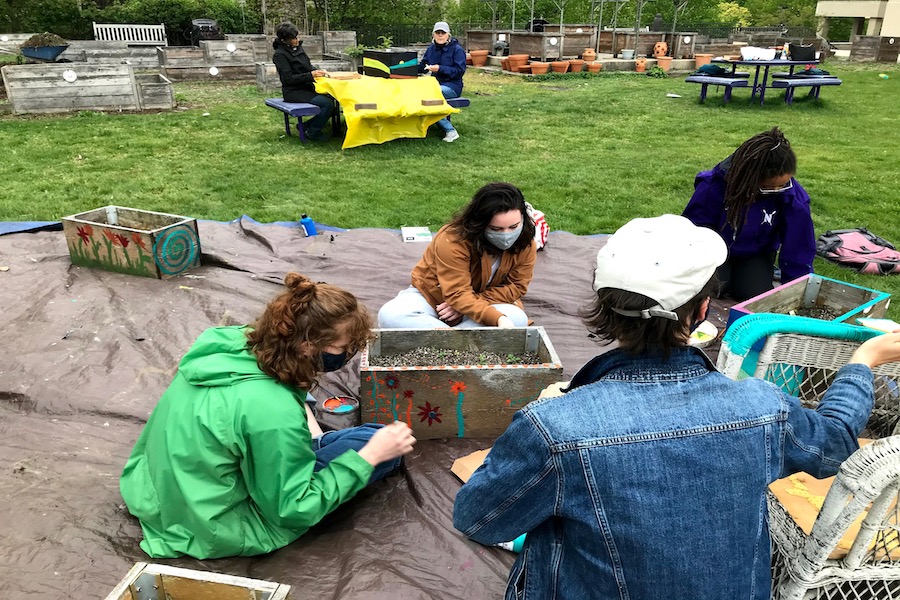Fossil Free NU hosts teach-in on divestment, abolition, Indigenous rights
Students paint garden boxes at the Wild Roots Garden as part of Fossil Free’s weekend teach-in. The Saturday afternoon art and gardening event preceded four virtual workshops.
May 16, 2021
Through virtual and in-person events, Fossil Free Northwestern hosted a weekend teach-in on climate justice, divestment, abolition and Indigenous rights.
The teach-in kicked off with a Friday night dinner, before a Saturday afternoon art and gardening event at the Wild Roots Garden, a student-run vegetable garden on campus. Organizers also held four virtual workshops on Saturday and Sunday in collaboration with the Native American and Indigenous Student Alliance and NU Community Not Cops.
After a year of almost entirely virtual organizing, Communication sophomore and Fossil Free organizer Lucy London said it was “a great joy” to gather in-person.
“Forming relationships (with each other) is part of the work, and it feels good to connect with folks again,” London said.
London led a “Stopping Line 3” workshop about the movement against a proposed pipeline expansion in Wisconsin that would cross Indigenous lands. London, who worked with members of the NAISA to plan the workshop, said the intersection of climate justice with other social justice issues was a focus of the weekend.
“We are trying to connect with where the environmental justice movement as a whole is putting its focus,” London said. “Line 3 is one of those really critical fights right now.”
Communication junior Maya Reid led a “Divestment 101” workshop, in which she explained why Fossil Free has advocated for NU to divest from any of the top 100 coal, oil and gas companies. She said a focus of the session was discussing why divestment should go beyond halting investments in fossil fuels.
Reinvesting in organizations and causes that are “life-giving” to the NU community is also a part of Fossil Free’s divestment proposal, Reid said.
“That can be a number of things, whether (NU) wants to invest in some renewable energy sources, or whether they want to give directly to our community and spend that money helping students,” Reid said.
Reid cited the expansion of Counseling and Psychological Services — which students have reported has consistently low availability — as one way for the University to directly reinvest in its community.
Fossil Free has also prioritized continually meeting with and contacting the Board of Trustees, Reid said, despite the Board of Trustees Investments Committee’s rejection of their proposal last February. The organization plans to meet with newly-instated Chief Investment Officer Amy Falls before the end of the quarter, Reid added.
“A big goal of ours was just to meet her,” Reid said. “She’s not one of the people who rejected our proposal, so we’re really just trying to see where she’s at with things.”
In the “Northwestern Hierarchies of Power” workshop, organizers discussed the history of Fossil Free’s relationship with NU administration and the board, including lessons learned on how best to enact change within the NU hierarchy.
The weekend wrapped with a “Living Abolition” workshop, where abolitionist organizer Adriana Martinez-Smiley led participants in activities and discussion on how to practice abolition in their everyday life.
“We’ve adopted the idea of incarceration and punishment in our own relationships, so we’re thinking of abolition as a way to counter these logics,” Martinez-Smiley said. “Enacting harm does not mean you’re worthy of punishment. Disentangle the idea of punishment with the idea of justice.”
Email: [email protected]
Twitter: @maiapandey
Related Stories:
— NUCNC, Fossil Free Northwestern host protest for divestment from police, fossil fuels
— In Focus: Trustees and student activists at impasse after divestment proposal rejected


